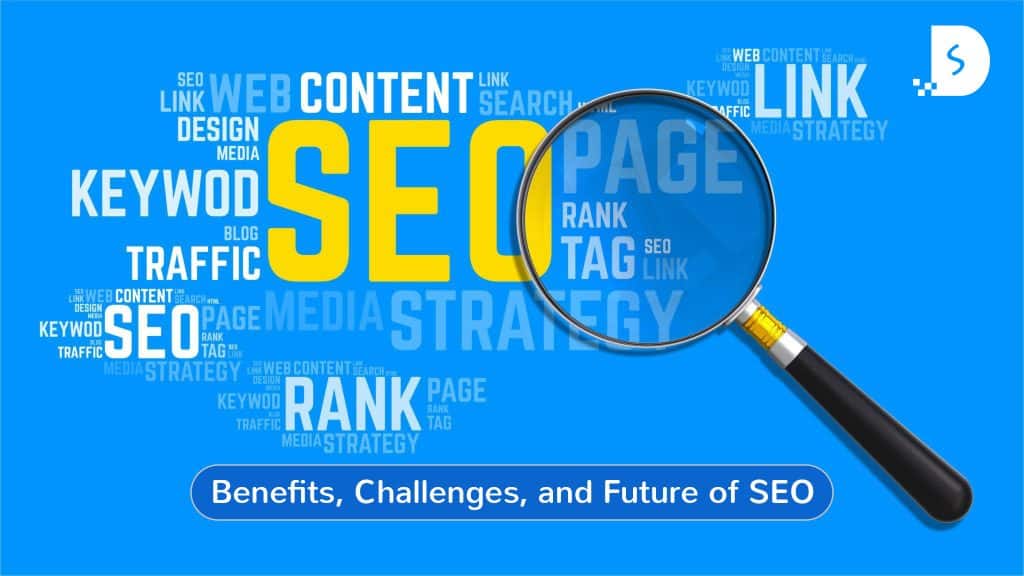In the fast-paced world of digital marketing, Search Engine Optimization (SEO) stands out as a crucial component for businesses aiming to establish a robust online presence. In this article, we will delve into the essence of SEO, exploring its intricacies and understanding how it becomes a game-changer for businesses seeking success in the digital realm.
Table of Contents
ToggleWhat is SEO?
SEO, or Search Engine Optimization, enhances a website’s visibility on search engines like Google, Bing, and Yahoo. The ultimate goal is to increase organic (non-paid) traffic to a website by improving its ranking on search engine results pages (SERPs).
Critical Components of SEO
1. Keywords
At the heart of SEO lies the strategic use of keywords. These are the terms and phrases potential customers are likely to enter into search engines when looking for products or services.
2. On-Page SEO
This involves optimizing individual web pages to rank higher and earn more relevant traffic. It includes optimizing content, HTML, and other elements on a page.
3. Off-Page SEO
Off-page SEO focuses on activities outside the website, such as link-building, social media marketing, and influencer outreach. It contributes to building a website’s authority and credibility.
4. Technical SEO
Technical SEO deals with the technical aspects of a website, ensuring that search engines can crawl and index it efficiently. This includes site speed, mobile-friendliness, and secure connections (HTTPS).
5. User Experience (UX)
Google values websites that provide a positive user experience. This involves page load speed, mobile responsiveness, and easy navigation.
6. Content Quality
High-quality, relevant content is a cornerstone of SEO. Search engines aim to deliver valuable results to users, so websites with informative and engaging content tend to rank higher.
7. Local SEO
For businesses with physical locations, local SEO is crucial. This includes optimizing for local searches, managing online reviews, and ensuring accurate business information on platforms like Google My Business.
How Does SEO Benefit Business?
Now that we’ve covered SEO fundamentals, let’s explore how it can significantly benefit businesses.
1. Increased Website Traffic
SEO is primarily about increasing a website’s visibility in search results. Businesses can attract more visitors by optimizing for relevant keywords expanding their reach and potential customer base.
2. Cost-Effectiveness
Compared to paid advertising, SEO is a cost-effective long-term strategy. While produced advertising delivers immediate results, SEO efforts compound over time, providing sustainable traffic without ongoing ad spend.
3. Builds Credibility and Trust
Websites that appear on the first page of search results are often perceived as more credible and trustworthy. Users tend to associate higher rankings with industry authority, increasing trust in the brand.
4. Better User Experience
SEO isn’t just about pleasing search engines; it’s also about creating a positive user experience. A well-optimized website with fast load times, easy navigation, and relevant content contributes to a better user experience.
5. Higher Conversion Rates
Targeting specific keywords and optimizing content often means attracting users actively searching for products or services. This targeted traffic will more likely convert into customers, increasing conversion rates.
6. Insights into Customer Behavior
SEO tools provide valuable insights into customer behavior. Businesses can analyze data related to website traffic, popular keywords, and user engagement, allowing them to make informed decisions and refine their strategies.
7. Adaptation to Evolving Trends
The digital landscape is dynamic, with search engine algorithms frequently evolving. SEO forces businesses to stay abreast of these changes, fostering adaptability and ensuring their online strategies remain effective.
8. Competitive Advantage
SEO can provide a significant competitive advantage in industries where competition is fierce. A top-ranking website is likelier to capture users’ attention, leaving competitors in the digital shadows.
9. Global Reach
For businesses aiming for a worldwide audience, SEO is indispensable. Optimizing for international searches and languages can help a brand break geographical barriers and tap into new markets.
10. Measurable Results
Unlike some traditional marketing methods, the impact of SEO is measurable. Businesses can track key metrics such as organic traffic, conversion rates, and keyword rankings, allowing them to gauge the success of their SEO efforts.
SEO Challenges and Strategies for Success
While the benefits of SEO are evident, it’s essential to acknowledge the challenges businesses might face and strategies to overcome them.
Challenges
1. Algorithm Changes
Search engines frequently update their algorithms. Staying ahead of these changes and adapting strategies accordingly is a constant challenge.
2. Intense Competition
In competitive industries, numerous businesses are vying for the same top spots. This makes it crucial to refine and enhance SEO strategies continually.
3. Technical Complexity
Technical SEO can be complex, requiring a deep understanding of website structure, coding, and server configurations.
Strategies for Success
1. Quality Content Creation
Content remains king in the digital realm. Creating high-quality, relevant, and engaging content is fundamental to successful SEO.
2. Keyword Research
Thorough keyword research is the foundation of SEO. Understanding your audience’s language helps tailor content and optimize for the correct terms.
3. Regular Technical Audits
Conducting regular technical audits ensures that a website remains search engine-friendly. This includes checking for broken links, optimizing site speed, and providing mobile responsiveness.
4. Link-Building
Building a strong backlink profile is crucial for off-page SEO. Quality links from reputable sources contribute to a website’s authority.
5. User Experience Optimization
Prioritizing user experience elements, such as easy navigation and mobile responsiveness, enhances both SEO and user satisfaction.
6. Social Media Integration
Social signals play a role in SEO. Integrating social media into the digital marketing strategy can provide a more comprehensive online presence.
7. Local SEO Optimization
For businesses with physical locations, optimizing for local searches is essential. This includes maintaining accurate business information and encouraging positive online reviews.
8. Data Analysis
Regularly analyzing SEO data provides insights into what is working and what needs improvement. Businesses can use these insights to refine their strategies and stay ahead of the competition.
The Future of SEO in Digital Marketing
As technology advances and user behaviors evolve, the future of SEO will likely see several trends shaping the landscape.
1. Voice Search Optimization
With the rise of virtual assistants and smart speakers, voice search optimization is becoming increasingly important. Businesses will need to tailor their SEO strategies to accommodate natural language queries.
2. Mobile-First Indexing
Google’s shift to mobile-first indexing highlights the growing importance of mobile optimization. Websites that prioritize mobile responsiveness are likely to perform better in search rankings.
3. Artificial Intelligence (AI) Integration
AI is playing a more significant role in search algorithms. Businesses that leverage AI in their SEO strategies, such as for content creation and personalization, may have a competitive edge.
4. Ephemeral Content and Visual Search
The popularity of brief content on platforms like Instagram and the rise of visual search indicate a shift toward more visual and interactive search experiences. Businesses should consider incorporating visual elements into their SEO strategies.
5. User Intent Optimization
Understanding and optimizing for user intent is crucial. Search engines are becoming more sophisticated in interpreting the context behind search queries, and businesses that align their content with user intent will likely see better results.
Conclusion
SEO remains a cornerstone of successful digital marketing strategies in the vast digital landscape. From increasing website traffic to building credibility and adapting to evolving trends, the benefits of SEO for businesses are extensive. As we look to the future, staying ahead by embracing emerging trends and continually refining SEO strategies will be vital to maintaining a robust online presence and reaping the rewards of sustained digital success.








